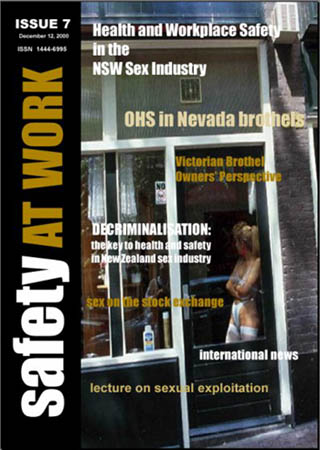The occupational health and safety of sex workers is one of the most difficult areas to write about as the industry is politically and ideologically charged with matters of feminist ideology, human rights and sex trafficking, religious morality and NIMBY lobbying. In such an environment, it is important that the OHS needs of sex workers not be forgotten.
 On 13 July 2011, The Age newspaper reported on the threat of legal action by one sex workers on a Victorian licensed brothel, Butterflys of Blackburn. The article raised many OHS issues for the brothel industry. In short, the article reports that a sex worker is suing the brothel because the brothel, allegedly, established an expectation that the sex workers would allow unprotected sex, sexual acts without a condom or other protection, an offence under Victorian law. This particular sex worker’s experience in Butterflys of Blackburn was that, when refusing unprotected sex to a client, the client assaulted her, attempted to rape her and threatened her with a gun.
On 13 July 2011, The Age newspaper reported on the threat of legal action by one sex workers on a Victorian licensed brothel, Butterflys of Blackburn. The article raised many OHS issues for the brothel industry. In short, the article reports that a sex worker is suing the brothel because the brothel, allegedly, established an expectation that the sex workers would allow unprotected sex, sexual acts without a condom or other protection, an offence under Victorian law. This particular sex worker’s experience in Butterflys of Blackburn was that, when refusing unprotected sex to a client, the client assaulted her, attempted to rape her and threatened her with a gun.
The Age reports that the woman “has since been diagnosed with post traumatic stress disorder, whiplash in her neck and a torn muscle in her shoulder.” The worker is already receiving workers’ compensation and is pursuing compensation for permanent impairment. Her plans for suing the brothel relate to the accusation that the brothel failed to provide a safe workplace. Continue reading “Brothel safety gains new media attention”

